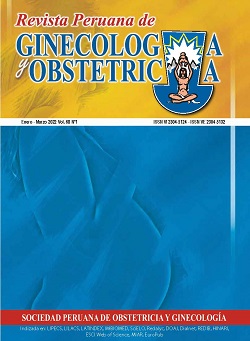Vitamin D deficiency and gynecological pathologies in women of reproductive age
DOI:
https://doi.org/10.31403/rpgo.v68i2387Keywords:
Vitamin D, Polycystic ovary syndrome, Uterine leiomyomatosis, Endometriosis, In vitro fertilizationAbstract
Vitamin D is currently under investigation in many fields of medicine. It is known to have fundamental functions in calcium metabolism and bone modeling. Vitamin D deficiency defined as 25-hydroxychalciferol concentration < 20 ng/mL and is frequently observed in patients with gynecological pathologies. In the last two decades there is evidence on the association of low serum vitamin D concentrations with disorders such as diabetes mellitus and metabolic syndrome. There are increasing reports of the impact of vitamin D metabolism on the development of disorders of the female reproductive system. Vitamin D receptor and 1α-hydroxylase are present in the reproductive organs, suggesting that vitamin D may have some effect in modulating cellular functions. The detrimental effects of deficiency have been shown in patients diagnosed with polycystic ovarian syndrome, endometriosis, and leiomyomatosis. Vitamin D supplementation should be added to the treatment schemes of most gynecologic pathologies in patients with deficiency, both for the improvement of insulin resistance (as in patients with polycystic ovarian syndrome) and for the outcomes of infertility treatment. The aim of this review was to establish effects of vitamin D deficiency on pathologies in women of reproductive age.
Downloads
Downloads
Published
How to Cite
Issue
Section
License
Copyright (c) 2022 Jorly Mejia-Montilla, Nadia Reyna-Villasmil, Eduardo Reyna-Villasmil

This work is licensed under a Creative Commons Attribution 4.0 International License.
Esta revista provee acceso libre inmediato a su contenido bajo el principio de que hacer disponible gratuitamente la investigación al publico, lo cual fomenta un mayor intercambio de conocimiento global.















